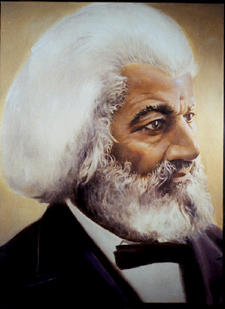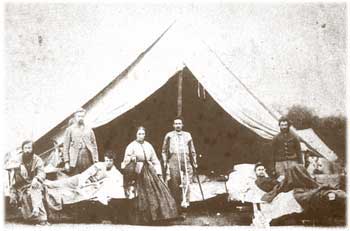Disney in the Classroom
Page 2 of 5
Such a private would probably have his picture taken as soon as he arrived in Washington. Young men then, as now, were anxious to demonstrate that they really were in the military. (Especially since there was probably a young woman back home sure to be impressed by this.) Matthew Brady took photographs of thousands of these young men. Many of these photographs still exist today. Brady also took many pictures of Lincoln. (Like the one at the beginning of this article.) Since Brady was familiar with the President it is likely he would know that a private wanting to see the President would have to wait a long time to do so; he even might take such a young man along with him to a sitting with Lincoln. After all Lincoln was "the soldier's President".

Since Lincoln met with so many people his appointments probably overlapped each other. This meant that someone might be surprised that the President had invited a black leader to the White House. (No other President had ever done this.) That black man would have been Frederick Douglass; who in his first meeting with the President "pressed upon Lincoln the need for more official recognition of black troops, including the vexing issue of unequal pay for blacks." (White p. 161) Lincoln took Douglass' counsel at least twice during his Presidency and he also invited Douglass to his Second Inauguration; the first time a black leader was honored in this way.

When Lincoln was not meeting with people at the White House he often visited wounded soldiers in "the forty or more hospitals" (White p. 27) in the Washington area. A private wounded in battle might be brought directly to one of these hospitals since so many battles took place near the Capital. (123 battles took place in Virginia alone, including one on October 14, 1863. This was at about the same time as Lincoln received his invitation to the dedication of the cemetery for the Union soldiers killed at Gettysburg.) By 1863, female nurses ran many of these hospitals. Only men had run hospitals at the beginning of the war and it was common for sixty percent of the wounded brought to these hospitals to die. When women took over the hospitals the death rate for the wounded dropped by as much as two-thirds. This has been credited to a willingness to talk to and to comfort wounded soldiers (most men would not do this) and to a much improved standard of cleanliness.
So the story of Private Cunningham is quite plausible and it is made more accessible by being presented in an entertaining fashion. (The gimmicks in the show while irritating to some, involve the people in the audience by making them laugh and pay closer attention to what is happening.) The presentation is also impressive in its breadth. It highlights the contributions black men and white women made to the war effort; and it deals with the two key issues that Lincoln struggled with during the Civil War: justifying the deaths of hundreds of thousands of soldiers and how to manage the effect a Union victory in the War would have on black Americans' rights. We of course, know that Lincoln struggled with these issues because of what comes next in the program- The Gettysburg Address.

"Four score and seven years ago, our fathers brought forth on this continent a new nation: conceived in liberty, and dedicated to the proposition that all men are created equal.
Now we are engaged in a great civil war, testing whether that nation, or any nation so conceived and so dedicated, can long endure. We are met on a great battlefield of that war. We have come to dedicate a portion of that field as a final resting place for those who here gave their lives that this nation might live. It is altogether fitting and proper that we should do this.
But, in a larger sense, we cannot dedicate ... we cannot consecrate ... we cannot hallow ... this ground. The brave men, living and dead, who struggled here, have consecrated it, far above our poor power to add or detract. The world will little note, nor long remember, what we say here, but it can never forget what they did here. It is for us the living, rather, to be here dedicated to the unfinished work which they who fought here have thus far so nobly advanced. It is rather for us to be here dedicated to the great task remaining before us ... that from these honored dead we take increased devotion to that cause for which they gave the last full measure of devotion ... that we here highly resolve that these dead shall not have died in vain... that this nation, under God, shall have a new birth of freedom ... and that this government of the people ... by the people ... for the people ... shall not perish from the earth."
-Abraham Lincoln
